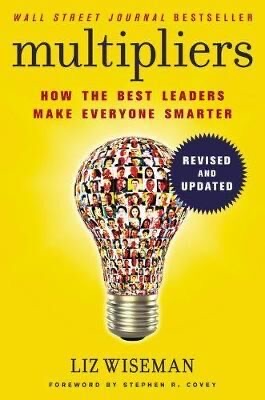Are you a multiplier?

So, I’ve been reading a brilliant book I’d recommend to anyone already managing staff or thinking about it:
The book is called Multipliers: How the Best Leaders Make Everyone Smarter by Liz Wiseman
It explains how some leaders let those around them make them smarter, while others negatively impact their team’s performance.
If I reflect on my personal experiences working for other people’s companies’, I definitely encountered owners and managers who had a negative impact on their teams.
What I noticed, however, was that many of them fell into these management positions through just starting a business, and never had any proper training. None.
I think there’s often an expectation that people will naturally know how to manage, but it’s a skill that takes time to develop. Most people are not naturals. Some people are really crap at it too. So crap it is the number one reason people leave a job.
Not the money.
Not the industry
Not the work or even the workload.
It’s because of the person they directly report to and them not being on the same page.
Let me summarise the book and share some helpful pointers, and I think this has relevance for managing a family too.
The book explores two leadership styles:
Multipliers and Diminishers.
Multipliers are leaders who amplify the intelligence, creativity, and capabilities of their teams. They create an environment that encourages independent thinking and problem-solving.
I call this a faith based approach. It results in an upwards spiral.
On the other hand, Diminishers unintentionally stifle growth by micromanaging or taking control, often without realising the impact they have on their team.
I term this a fear based approach. It results in a downwards spiral.
The purpose of the book is to show you how to be a leader who uplifts your team, creates a work culture where people feel fulfilled, and adds value that propels the business forward not stops it in its tracks.
Now, just to be clear, a Multiplier is not a pushover!!
They set high standards for their team and expect excellence, but they do so in a way that fosters growth and innovation.
5 Disciplines of Multipliers
Here’s a quick overview of the 5 key traits of a Multiplier – it’s interesting to reflect and see if you’re already doing some of these or having some of these done to you!
- The Talent Magnet: You identify a team member’s hidden talent and provide them with new opportunities to use this skill, attracting other talented individuals to join the team.
- The Liberator: In meetings, you encourage open sharing of ideas without judgement, creating a safe space where team members know mistakes are part of the learning process.
- The Challenger: You set ambitious goals, such as a challenging deadline, and say, “I know you can do this.” This pushes the team to find creative solutions and exceed expectations.
- The Debate Maker: Before making key decisions, you gather the team for a structured debate, inviting strong arguments both for and against the idea. This approach ensures that all perspectives are considered.
- The Investor: You assign a project to a team member, saying, “This is your project. I trust you.” They provide the necessary resources but avoid micromanaging, giving the team member full ownership.
Putting It Into Practice
It might be overwhelming to tap into all 5 disciplines immediately. That’s fine. No one is perfect. Progress not perfection.
I’ve created some questions to support our team
at Sobar Ltd., and the suppliers and partners we’ve chosen to work with and who have chosen working with us.
They’re open-ended and can help empower your team but the gist of them really boils down to:
Use your brain not mine!
- “I’m happy to help you think this through, but I’m looking for you to take the lead. What support do you need?”
- “What would you like to do to fix this?”
- “What do you think is the best approach?”
- “How do you propose we solve this?”
- “What options have you considered?”
- “What solutions do you have for this problem?”
- “How can we simplify this?”
- “What other options have you considered?”
Feel free to use these yourself. I want to hear the result please.
What I took away from this book is that being a manager is not just about being a ‘nice’ manager; it’s about being a leader who truly brings out the best in their team especially when it means supporting their own ambitions even above their own.
I would love to hear your own management ethos or leadership style and hear how it benefits those you are supporting.